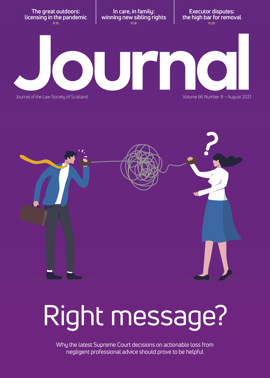Family: Litigation and lottery wins
A divorce involving a lottery win of £11,065,500 is bound to attract attention, but this case is noteworthy for the extent to which the attempt to deprive one spouse of their share was unpicked by the court.
In HAJ v NJ [2021] CSOH 67 (22 June 2021), the pursuer and first defender were married on 3 April 2015 and separated on 4 October 2018. Wife (W) raised an action of divorce against her husband (H) seeking, amongst other things, an order under s 18 of the Family Law (Scotland) Act 1985 setting aside the transfer of £5,995,000 from H to his parents on 29 August 2019.
Six months after the parties married, H won £11,065,500 in the EuroMillions. At the date of separation, the remaining winnings (amounting to over £9 million) were held in H’s name. Between August and September 2019 (after the parties had separated but before the divorce action had been raised), H transferred £8 million to his parents. When the action was raised, H’s parents entered the process (as second and third defenders) to assert that they had an interest in a large proportion of funds held by H at the date the parties separated.
Whose winnings?
H’s position was that the winnings were not matrimonial property, and even if they were, they should be shared unequally in his favour. He initially pled that the funds in his account at the relevant date were gifted to him by his parents. This averment was subsequently withdrawn. His position on record at proof, and in submissions made on his behalf, was that the funds belonged to his parents and he was holding them as their agent. However, this was entirely inconsistent with his evidence, which was that the funds belonged to “the family” (he and his parents – which excluded his sister, his wife and his children). This was inconsistent with his parents’ position, which was that the funds belonged to them because the funds used to purchase the lottery ticket belonged to them and therefore the winnings did also.
Five professional witnesses (two solicitors, two banking managers and an accountant) spoke to their understanding that it was H who had won the lottery and that the winnings belonged to him. H’s mother, in a scene worthy of any television drama, accidentally referred to the lottery proceeds as her son’s money during her evidence and then tried to correct herself! Not to mention the evidence of a relationship manager with HSBC, whose evidence was that on 30 January 2020, H’s mother told her that the money in her account belonged to her son, that he was going through a messy divorce and she wanted to hide the money but had received a “freeze order” through the courts.
The court had granted an interim interdict on 23 January 2020 against alienation of funds by H or anyone on his behalf. On 16 September 2020, the court pronounced an order prohibiting H’s parents from “intromitting, disposing or otherwise transacting with money and property”.
Despite these orders, H’s mother unsuccessfully attempted to intromit with the funds on a number of occasions, attempting to transfer £8.7 million on 29 January 2020, requesting that funds be released to her on 27 October 2020, and attempting to withdraw £250,000 (this time with H’s assistance) on 12 November 2020.
Effective order
Against that background, it is perhaps unsurprising that H was described as “a most unsatisfactory witness”, and his mother “an extraordinarily poor witness”. Lady Wise went so far as to say: “it is rare in my experience for litigants to be exposed quite so devastatingly”. She determined that the lottery proceeds belonged to H and that the remainder of the winnings held by him at the relevant date constituted matrimonial property. W was awarded 50% of the total matrimonial property, resulting in a capital sum of £4,800,676, with interest at the judicial rate from the date the summons was served.
Of course, that would have been a toothless order standing the fact H had divested himself of 95% of the assets he held at the date the parties separated, had it not been for the order sought under s 18.
On considering the conclusion to set aside the transfer of £5,995,000 from H to his parents, Lady Wise was “entirely satisfied” that the test had been met and granted the conclusion. She reminded us that it is not strictly necessary to prove that it was the intention of the transaction to defeat in whole, or in part, the claim (of W), because it is the effect of the transaction on W’s claims that requires examination in terms of the statutory test.
While the vast majority of cases don’t usually involve lottery wins and the many, many silver bullets that existed here, this case is an example of the far-reaching powers available to the court under the 1985 Act.
In this case, it literally recovered millions for the wife.
Regulars
Features
Briefings
- Criminal court: Sentencing deconstructed
- Family: Litigation and lottery wins
- Human rights: Reinforcing the right to be forgotten
- Pensions: Plugging the LGPS exit credit hole
- Criminal law: The future of sexual offence trials
- Scottish Solicitors' Discipline Tribunal
- Property: Heat networks: the key to low-carbon heating?
- In-house: Power of the nudge






